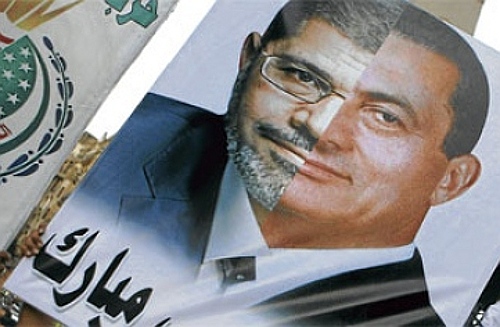
One protester held a sign that read "Mohamed Morsi Mubarak".

Egypt’s opposition supporters have set fire to Muslim Brotherhood offices in several Egyptian cities, a day after President Mohamed Morsi assumed sweeping new powers.
State media report the Muslim Brotherhood offices were on fire in the Suez Canal cities of Suez, Port Said, and Ismailia.
Demonstrators also gathered in Cairo’s Tahrir Square after Friday prayers for protests against the president’s decision, which was announced in a decree Thursday, citing a need to “protect the revolution.” Opposition members have called the move illegal.
Opposition leader and Nobel laureate Mohamed ElBaradai, who says Morsi has declared himself a “new pharaoh,” is expected to attend Friday’s protests. The liberal politician and former chief of the U.N. nuclear energy agency says Morsi has usurped all state powers and warned that there could be dire consequences.
Meanwhile, supporters of the Muslim Brotherhood have gathered outside the presidential palace in Cairo to demonstrate support for the president, who aides say may address the nation later Friday.
The decree also bars Egypt’s judiciary from dissolving the upper house of parliament and an assembly drafting a new constitution — two bodies dominated by Morsi’s Islamist allies.
In addition, Morsi has ordered retrials of former officials who used violence in efforts to suppress last year’s popular revolution against longtime president Hosni Mubarak.
Morsi’s supporters say his decree was long overdue.
The president’s action comes after he received international praise for mediating a Gaze cease-fire.
Egyptian courts have been examining cases demanding the dissolution of both assemblies. But Morsi’s decree effectively neutralizes the judiciary system in favor of the ruling Muslim Brotherhood.
The announced retrials for those suspected of involvement in the killings of protesters during the 2011 uprising, could include a retrial of former President Hosni Mubarak. The ousted leader was sentenced to life in prison in June for failing to stop the killings. But he avoided convictions on more serious offenses of corruption and ordering the deadly crackdown, angering many Egyptians.
Other Mubarak-era officials and security personnel also have been acquitted on charges of killing protesters, prompting critics to accuse the top government prosecutor of mishandling the cases. In his decree Thursday, Morsi fired that prosecutor, Abdel-Maguid Mahmoud, a Mubarak appointee who had been in the post for many years. The decree retroactively limited Mahmoud’s term to four years, bringing it to an immediate end.
President Morsi had tried to fire Mahmoud last month but was blocked by the courts. He named Talat Abdullah as the government’s new general prosecutor.



